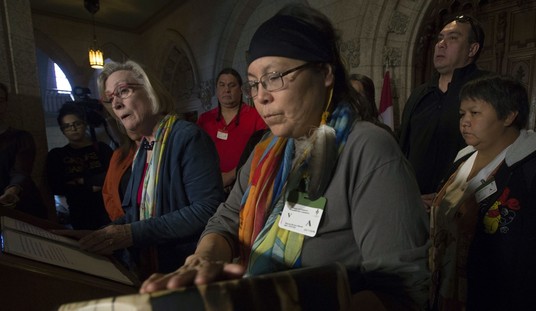It was a night for celebrating at the headquarters of Israel’s Kadima party, after exit polls showed that their team, led by Tsippi Livni defeated their chief rival, Likud and Binyamin Netanyahu.
Consistently, the polls show her party the leader of the two largest parties. The three networks’ exit polls, published at 10 PM Israel time when the polls closed, show a gap of at least two Knesset seats. It was undeniably a dramatic personal victory, with Livni leading her party to a comeback in the polls far beyond expectations — just weeks ago, Kadima trailed Likud by a far wider margin. (UPDATE: Israelis woke Wednesday morning to the news that Livni’s actual lead was narrower than the polls had indicated — a mere one seat ahead of Likud)
But the ecstatic rejoicing at her party headquarters could be short-lived. When it comes to building a coalition, the task won’t be simple for whichever leader President Shimon Peres charges with the task.
Presuming that person is Livni, she will have to face the fact that while she may have out-polled the Likud, simple arithmetic shows that the right-wing bloc is significantly larger than the left-wing bloc — a fact which will make her job of coalition-forming extremely challenging.
The big question is if a unity government is possibly in the cards. Presuming Livni gets first crack at forming the government, she has the option of inviting the Likud to join her. They can then either accept — or hold out, hoping that her attempt fails and they will get a turn at coalition-building.
There was a clear sign that Netanyahu and the Likud have no plans to make life easy for Livni. Immediately after the results came in, Netanyahu declared that he, not the woman who out-polled him, would be the next prime minister.
He’s done it before, as Bradley Burston of Ha’aretz was quick to point out:
The predicted results, if they stand up in the actual vote count and in the later tallies of soldiers’ votes, would be a stunning mirror-echo of Netanyahu’s triumphant 1996 run for the premiership, in which he overcame a 20 percentage point deficit in opinion polls to edge incumbent Shimon Peres.
It will fall to Peres, as president, to make the decision on whether to ask Livni or Netanyahu to try to form the government. Netanyahu’s task would likely be numerically easier, as he could rely on right-leaning parties for 63-64 Knesset votes, clearing the 61 needed for approval.
But initial indications showed that Livni could field a broad coalition anchored by Kadima’s 29-30 seats, the Likud’s 27, and the 13 expected to be held by the center-left Labor.
Indeed, most of the walking wounded following the exit polls are on the left, notably the once-indomitable Labor Party, whose support sank to a pitiful 13 seats, leading pundits to speculate immediately that Ehud Barak’s days as party leader may once again be numbered.
Posted February 9: Malaise in Israel on Eve of Election
Never have so many Israeli voters been so undecided so close to the day of an election.
In a country that is famous for being traditionally divided between left and right, where strong opinions are the order of the day, few Israelis feel that their vote tomorrow might truly help put their country on a path towards peace and progress. Many may be voting with full determination and earnestness, but few are voting with certainty.
The day before the election, it seems that everywhere one goes, everyone is quizzing each other with the same question: “So, do you know who you are voting for?”
When the answer “I haven’t decided yet” is given, what follows is not a lobbying effort to convince one’s conversation partner, but usually commiseration: “Neither have I.”
What generally ensues is a dialogue as to which parties are under consideration, and the pros and cons of the decision.
Such conversations are remarkably similar on both the right and the left. The two major parties — Kadima and Likud — are in a neck and neck tie in the last round of pre-election polls. Under the Israeli system, following the election the country’s president charges the party leader with the best chance of forming a coalition with the job of forming a government. The two candidates in this case are obviously Likud’s Binyamin Netanyahu or Kadima’s Tsipi Livni.
Israelis get one vote, and there are a myriad of parties to choose from, each emphasizing everything from a particular interest — everything from religion to environmentalism. Both right and left must decide whether to vote with their head or their heart. Many whose true political sentiments fall significantly further left than Kadima — whose list is populated with not a few right-wing members — or who are attracted to the Green Party are being sorely tempted (and openly pressured) to give their vote to Kadima in order to block Netanyahu’s ascension to power. As a newly popular Facebook group puts it, “Anybody But Bibi.”
Akiva Eldar explored this dilemma in his column entitled “A Guide For the Perplexed Leftist” in Ha’aretz, the left-center voter’s newspaper of choice:
The mix that is the center-left bloc has turned Kadima, Labor and Meretz into identical triplets. It doesn’t matter which of these parties you vote for, but rather which you don’t vote for. As long as the ultra-Orthodox-right-wing bloc is stopped.
Who knows, perhaps Kadima will catch up to Likud at the last minute, and it would be a waste to use up a vote on the Labor Party. On the other hand, if Ehud Barak can eke out another two Knesset seats, perhaps he will pull the next government a bit to the left. But if we are already talking about the left, then why not go another step and vote Meretz?
On the right, the Likud and Binyamin Netanyahu face the tough challenge of preventing their voters from migrating further right, where there are a wealth of options — Shas, Ha Ichud Ha Leumi, the religious “Jewish house” party, and Yisrael Beitenu, led by Avigdor Lieberman, the man who has reshuffled the political deck of cards more than any other figure in this campaign.
As the father of one of my daughter’s friends put it as he came to pick her up from a playdate, “If you feel strongly right-wing, why compromise on Bibi? Why not go all the way?”
Just as Kadima are pressuring left-leaning voters to jump on the Livni bandwagon, Likud is strong-arming those heading for Lieberman, Shas, and other right-wing parties to vote Likud and strengthen Netanyahu.
Even with all this activity, the pre-election atmosphere feels distinctly non-electric. In many ways, it feels as if this election has sneaked up on the Israeli voters. Traditionally, Israeli election campaigns have been like the long and exhausting process just completed in the U.S. — seemingly endless, with months of media focus on the race until the population is sick of the subject and desperate to discuss just about anything else.
However, this time around, the process of choosing a new Israeli government has been dwarfed by far more dramatic events. First it was the U.S. elections. Israel was gripped watching the story of Hillary, Obama, and McCain. The American campaign was a glossier and more compelling show, just as Hollywood movies normally overshadow local fare.
Besides, it seemed like there would be time to think about local politics after November 4. After that, Israelis figured, there would be three full months to think about their own choice.
But Hamas’ intensification of Kassam strikes became impossible for Israeli leaders to tolerate and the country was gripped by Operation Cast Lead, which began in late December, just when the campaigns would have been picking up steam.
By consensus, political matters were put aside as the media and the population focused on getting the residents of the south and the soldiers through the ordeal. With stories of life and death or fear and heroism all around, political sloganeering feels emptier than ever. Energy that might have been poured into political action was diverted into food drives for southern residents and collecting warm socks and underwear for soldiers.
When the guns fell (mostly) silent, and the time finally actually came to truly focus on politics, the switch seemed anti-climactic.
But the malaise isn’t merely attributable to the contrast between politics and the war. At the bottom of what some call apathy, others disgust or desperation, is the sense that the leader Israelis choose tomorrow are not truly what is going to determine their fate.
The people who have really called the shots over the past two decades — the Palestinians — aren’t going to the polls tomorrow. If Hamas remains in control of Gaza, or if the West Bank falls under Hamas control as some are warning, there seems to be little that any Israeli leader can possibly do to prevent a state of non-ending war and conflict.
And so, a relatively low turnout — by Israeli standards — is expected at the polls, continuing a disturbing trend for a country that prides itself on being a vibrant, participator democracy. When Israel voted in its first government in 1949, 86.9 percent of eligible voters cast their ballots. By 2001, that percentage dropped to 62 percent.
Some say that it isn’t that Israelis are anti-democratic, but that they are overdosing on democracy — caught in a system where it is all too easy for dissatisfied political parties to dissolve the government and call for early elections. As Amir Mizroch pointed out in the Jerusalem Post:
Israelis will go to their fifth general elections within a decade, and it seems the more Israelis go to elections, the less they’re interested in them.
And so this campaign feels unsettled, unfinished, and unsatisfying even as the polls are poised to open.
It’s not the first time Israelis have experienced jealousy regarding the system of direct proportional elections in the U.S. and the ability of the American electorate to make a clear-cut choice for their leaders, instead of facing a perplexing and headache-inducing Rubik’s cube of options.
But it may be the election year in which Israelis have felt that envy most strongly.









Join the conversation as a VIP Member